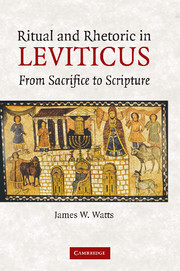Book contents
- Frontmatter
- Contents
- Abbreviations
- Preface
- Ritual and rhetoric in Leviticus
- 1 Introduction: Ritual Text and Ritual Interpretation
- 2 The Rhetoric of Ritual Instruction
- 3 The Rhetoric of Burnt Offerings
- 4 The Rhetoric of Sin, Guilt, and Ritual Offerings
- 5 The Rhetoric of Ritual Narrative
- 6 The Rhetoric of Atonement
- 7 The Rhetoric of Priesthood
- 8 The Rhetoric of Sacrifice
- 9 The Rhetoric of Scripture
- Bibliography
- Index of Biblical Citations
- Index of Other Ancient Literature
- Index of Authors
- Index of Subjects
6 - The Rhetoric of Atonement
Published online by Cambridge University Press: 22 July 2009
- Frontmatter
- Contents
- Abbreviations
- Preface
- Ritual and rhetoric in Leviticus
- 1 Introduction: Ritual Text and Ritual Interpretation
- 2 The Rhetoric of Ritual Instruction
- 3 The Rhetoric of Burnt Offerings
- 4 The Rhetoric of Sin, Guilt, and Ritual Offerings
- 5 The Rhetoric of Ritual Narrative
- 6 The Rhetoric of Atonement
- 7 The Rhetoric of Priesthood
- 8 The Rhetoric of Sacrifice
- 9 The Rhetoric of Scripture
- Bibliography
- Index of Biblical Citations
- Index of Other Ancient Literature
- Index of Authors
- Index of Subjects
Summary
This book has stated many times that the priestly writers of Leviticus give virtually no interpretations of the rituals they describe and prescribe. There is, however, an exception to this generalization. The P writers offer one explanation, or rather one word of explanation, rather frequently. That word is kipper, and it appears forty-nine times in Leviticus. It has traditionally been translated “to atone” and its prominence in P has led many ancient and modern interpreters to expound on P's theology of atonement. Any analysis of P's rhetoric would therefore be incomplete without attention to the meaning and uses of this word. Usage in context must play the key role in any rhetorical analysis of kipper in Leviticus. Does this one word explain the meaning of the offerings? Is that its purpose, or does it play other rhetorical roles?
The meaning of Kipper
Modern scholars have argued extensively about kipper's meaning. Older scholarship derived it from an Arabic cognate with the basic meaning “to cover.” Though translators have applied that meaning literally in some cases (such as Noah's “covering” the ark with pitch, Gen 6:14), they found in P a metaphorical usage referring to “covering” sins and impurities, hence “atone.” The derivation from Arabic “cover,” however, has been discredited over the last few decades in favor of one from an Akkadian cognate term meaning “to wipe off.”
- Type
- Chapter
- Information
- Ritual and Rhetoric in LeviticusFrom Sacrifice to Scripture, pp. 130 - 141Publisher: Cambridge University PressPrint publication year: 2007

